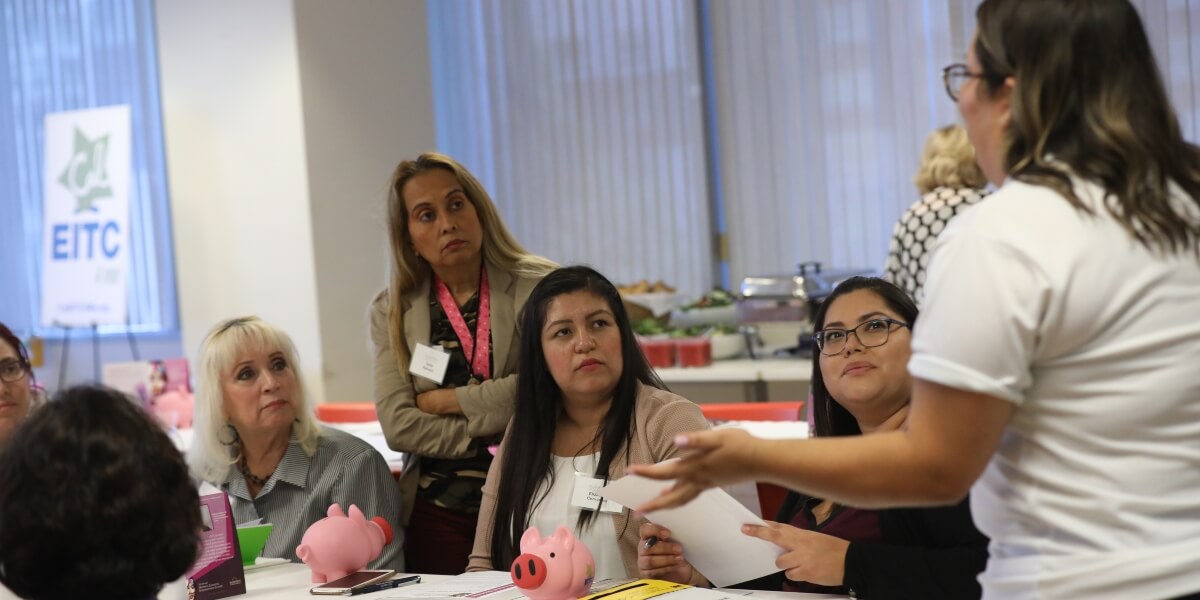LOS ANGELES – Part of Marlene Hoffman’s job as Program Assistant with Eastmont Community Center in East Los Angeles is to inform her clients, mostly low-income families, of programs that may put a little more cash in their pockets. In doing so, she learned that she too was eligible for the California Earned Income Tax Credit (CalEITC). Hoffman, who recently adopted two little boys says,
I am so thankful for EITC and what is has done for me. Being that I work in a Community Center gives me the opportunity to give this information to all my clients. I just make sure to mention to them they may qualify or even just to find out if they qualify so they can take advantage of these programs that are out there for them.
With the tax filing extension deadline approaching on Tuesday, October 15, a broad coalition of groups are working hard to educate working families that it’s not too late to claim the California Earned Income Tax Credit, for those who requested an extension on their taxes. Last Friday, the Golden State Opportunity (GSO) convened more than 40 county and city nonprofit organizations, foundations, municipal agencies and for-profit allies to examine how together, the coalition can expand the utilization of public benefits and tax credits among low-income households at its 2nd Annual Women’s Economic Empowerment Summit: Bridging Public Benefits & Tax Credits. The event was attended by public agencies, nonprofits, labor groups, faith-based organizations and elected officials to gather feedback, share tactics, and expand partnerships in order to order to maximize outreach and participation in the EITC program and other food and cash assistance, health coverage, early education programs. While Hoffman and more than 2 million households have claimed $380 million through the CalEITC in 2019, each year, close to $2 billion in state and federal EITC goes unclaimed in Calfornia. Laura Barrera, Los Angeles Director for Golden State Opportunity, told Revolution English,
The goal of this year’s Summit was to continue to broaden our advocacy for bringing financial security to more families by expanding our coalition of like-minded civic and government thought leaders, local and statewide community-based organizations, and for-profit allies to help increase the impact and reach of existing public benefits.

These benefits significantly boost household income for the nation’s most vulnerable families, including immigrants and limited-English speakers. Working-age limited English proficient (LEP) adults earn 25 to 40 percent less than their English proficient counterparts. Nearly one in 10 working-age U.S. adults—19.2 million persons aged 16 to 64—is considered limited English proficient (LEP). While less educated overall than English proficient adults, LEP workers have lower-paying jobs and more likely to live in poverty, making them prime candidates for the Federal and state EITCs, which can bring them greater financial security.
The CalEITC program is a similar program to the Federal Earned Income Tax Credit (EITC), a credit workers can take on their taxes. The credit may provide you with a refund or reduce the amount of money you might owe. There are some basic rules that workers must meet such as, having a Social Security number that is valid for employment and that was issued before the due date of the return. But if you meet the requirements, you could earn back an average amount of $2,488, for Federal EITC. If you qualify for the Federal EITC, you may also be eligible for a similar credit from your state or local government. Twenty-five states, plus local municipalities including the District of Columbia and New York City, offer residents an earned income tax credit for 2018. For the first time in 2019, California’s program made young adults, ages 18-24, without children, and older adults over age 65, eligible for the CalEITC. Furthermore, California has approved an expansion of their state program that will cover workers making up to $30,000, and provide families with young children an additional $1,000 credit, starting in 2020. Hoffman says of the expansion, “Knowing that the expansion has been approved for next year, it has just opened more doors for me. This would impact my life so greatly.”

